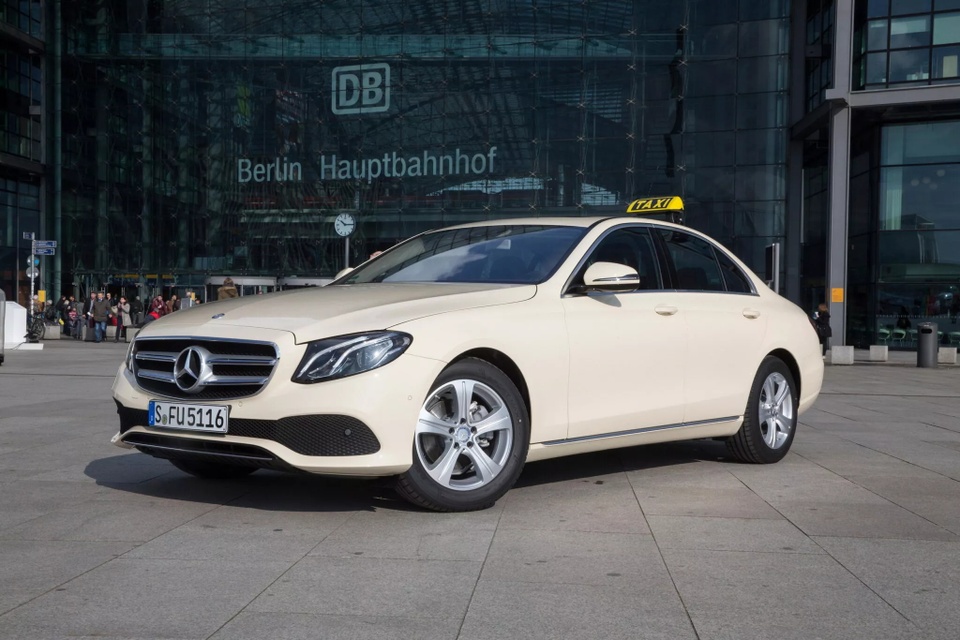
|
According to Carscoops, European taxi customers have long been accustomed to seeing Mercedes-Benz sedans as their ride of choice. However, this trend is rapidly changing, with the brand’s dominance in the continent’s taxi market waning in recent years.
Mercedes Taxi Sales Plummet
In Germany, Mercedes’ vehicle sales to transportation services (collectively referred to as taxis) plummeted by 71% in the first eight months of the year, reaching only 497 units compared to 1,730 vehicles sold during the same period last year.
Out of the total 497 Mercedes vehicles sold to taxi services, there were 127 E-Class cars (a decrease of 90%) and just one B-Class, marking a 95% drop compared to the first eight months of 2023. According to Carscoops, the Vito Tourer minivan is the only model from the Mercedes brand that has maintained stable sales in the taxi/service vehicle segment.
|
|
|
Mercedes-Benz used to be a popular choice for taxis in Germany. Image: Mercedes. |
Mercedes’ market share in Germany’s taxi sector has dropped from 52% in 2019 to 38% in 2023. Current data predicts that their share will further decline to just 13% as more taxi companies opt for other brands over Mercedes.
Volkswagen is currently leading the taxi market in Germany, largely due to the success of their minivan models like the Touran and Caddy. Even Toyota is outselling Mercedes in the taxi segment, thanks to special versions of their Corolla and RAV4 models.
Going back to 1896, German engineer Gottlieb Daimler, a pioneer in automobile and internal combustion engine development, is also credited with laying the foundation for modern taxis by introducing a taximeter to automobiles.
Up until the late 2010s, Mercedes proudly highlighted its “traditional partnership with the taxi industry.” So, what led to the decline in the German brand’s sales in the transportation services sector?
Not Aligned with Luxury Standards
Last year, Ola Källenius, CEO of the Mercedes-Benz Group, announced that the company would discontinue offering modified vehicles specifically for taxi services and would also stop providing special discounts to taxi companies.
A Mercedes executive shared with Handelsblatt that the taxi service “does not fit the brand’s luxury standards,” emphasizing that rivals like BMW and Audi are also not focused on this business segment.
|
|
|
Mercedes-Benz witnessed a significant drop in taxi sales during the first eight months of the year. Image: Mercedes-Benz. |
According to Carscoops, the primary factor behind Mercedes’ strategic shift lies in the scale of the taxi market in Germany. With only around 6,000-7,000 new taxis registered annually in the country, the market size is modest compared to the total passenger car sales of 2.8 million units per year.
Mercedes will continue to offer limousine models based on the E-Class, but the conversion of these vehicles into taxis will be handled by third-party companies.
Carscoops suggests that taxis could be a way for automotive brands to boost sales by providing customers with a chance to experience their vehicles. It appears that Mercedes no longer sees the potential in this strategy.
Recommended Reads for Your Next Trip
Our Vehicles section offers a diverse range of engaging book titles to accompany you on your journeys. Whether you’re on a short commute or a long road trip, these books will keep you entertained and enlightened along the way.
The All-New 2025 Volkswagen Golf GTI: A Powerful Revelation with a Twist for the US Market.
The 2025 Volkswagen Golf GTI delivers an impressive 242 horsepower, a slight bump from the previous year’s 241. But it’s the Golf R that sees a significant boost, now with an additional 13 horsepower. And, for the transmission, both models exclusively feature the DSG gearbox, offering a seamless and sporty driving experience.













































